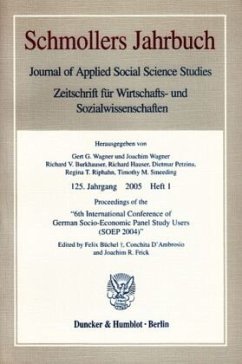The papers in this special issue of Schmollers Jahrbuch are a selection of those presented at the Sixth International Conference of German Socio-Economic Panel Study Users (SOEP 2004), held in Berlin from June 24 to June 26, 2004, in conjunction with the Second International Conference of Users of the European Community Household Panel (EPUNet 2004). Not only do these papers illustrate the multidisciplinarity of SOEP data users; they also give evidence of the global spread of SOEP, with presenters coming from Australia, North America and throughout Europe. At the same time, the conference papers reflect an increasing interest in methodological research as well as cross-national comparisons.
German reunification, and the concomitant transition from a socialist to a market driven economy, has always been a subject of great interest for diverse analyses, and SOEP data offers a unique source of information on this process. Two papers in this special issue investigate its effect an the labor market. Gathmann provides estimates of the relative wage loss of older workers during this transition, and shows that older workers lose up to 30% of their earnings through the depreciation of socialist work experience. Anger, an the other hand, focuses on the differences between East and West Germany in unpaid overtime, which is strikingly high in the East. She finds partial evidence that workers use overtime to signal higher productivity in order to reduce the risk of losing their jobs.
German reunification, and the concomitant transition from a socialist to a market driven economy, has always been a subject of great interest for diverse analyses, and SOEP data offers a unique source of information on this process. Two papers in this special issue investigate its effect an the labor market. Gathmann provides estimates of the relative wage loss of older workers during this transition, and shows that older workers lose up to 30% of their earnings through the depreciation of socialist work experience. Anger, an the other hand, focuses on the differences between East and West Germany in unpaid overtime, which is strikingly high in the East. She finds partial evidence that workers use overtime to signal higher productivity in order to reduce the risk of losing their jobs.




